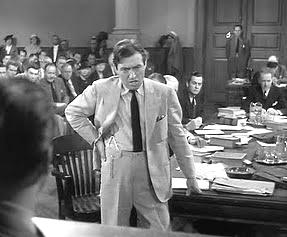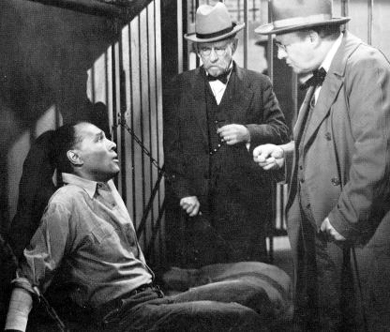
 |
|
|
|
Warners' 1937 liberal outrage movie They Won't Forget places a prominent disclaimer before the studio logo, the standard one about the story being fiction patterned upon nobody alive or dead. But it was directly based on a notorious and ugly incident in Marietta Georgia in 1915, known as the Leo Frank Knights of Mary Phagan Lynching. The shameful incident brought lynchings in the unreconstructed South to worldwide attention and served as further proof of hypocrisy and lawlessness in the self-proclaimed Land of the Free. Back in the 1930s producer-director Mervyn LeRoy was known as a maker of some of Warners' fiercest social document movies, such as Five Star Final, Two Seconds and I Am A Fugitive from a Chain Gang, a near open incitement to revolt against the injustices of the South. Warners' socially conscious films made them the favorite studio of liberals but also the butt of jokes about Red propaganda. The screenwriters worked overtime to infuse the movies with a sense of justice. In the end, pictures like Black Fury and Black Legion were done in not by political or business opposition but by the Hollywood censors of the production code, who protected American screens not only from sex and crime, but from political ideas considered too radical. Thus, a movie about the Klan shows hooded domestic terrorists attacking not blacks but recent immigrants. A movie about treachery in the mining industry bears signs of a major overhaul to "show both sides of the story" and "not exaggerate". Paul Muni finds peace in Black Fury at the same time that strikes were being put down by illegal, deadly force. 
They Won't Forget is an unusually understated thriller about a gross miscarriage of justice, an accusation leveled at the entire fictional town of Flodden as well as its opportunistic public officials and newspapers. The difference between the real case and the movie is that the real lynching was strongly motivated by anti-Semitic prejudice. Hollywood wouldn't touch the subject of ethnic prejudice against Jews until Crossfire, ten years later. The hatred, venality and appalling lack of civic responsibility on view in They Won't Forget is shocking even without that angle. Business school instructor Robert Perry Hale (Edward Norris of Decoy) is thinking of returning to New York with his wife Sybil (Gloria Dickson) because the Southerners of Flodden don't seem to like him. Then student Mary Clay (Lana Turner) is murdered in the school on a Confederate holiday. The ambitious D.A. Andy Griffin (Claude Rains) talks about justice but sees the trial as a way of propelling himself into the governor's office. The cops are ready to force a confession from the frightened school janitor Tump Redwine (Clinton Rosemond) but Griffin needs a better suspect for his political plans. Unfortunately, Hale was seen at the school at the wrong time by Mary's boyfriend Joe Turner (Elisha Cook, Jr.). Hale also had a spot of blood on his coat, which he says he got from a shave on Main Street. It is reported that Mary had a crush on Hale, but nobody points out that almost all the schoolgirls do. The cops intimidate Tump into suggesting that Hale is the murderer, while Joe Turner exaggerates his testimony to make himself appear more of a man. The barber denies giving Hale a haircut that day (and later receives a slap from his wife for lying). Reporter Bill Brock (Allyn Joslyn) and his cronies misquote an interview taken from Sybil Hale under false pretenses, further fueling local anger. They also play up the North vs. South angle, which brings detectives and a fancy lawyer from the North (Otto Kruger). But with witnesses lying left and right, the trial is a sham. Knowing that D.A. Griffin is primping for his job, the governor (Paul Everton) considers vacating a guilty verdict, if one is handed down. The townspeople rally behind the vengeful brothers of Mary Clay, who have determined that the issue will be resolved only one way, with a rope. 
They Won't Forget sneaks up on its mission to expose the evils of the South, by opening with a group of Civil War veterans (what, seventy years after the surrender?) preparing to march in the Southern pride parade. But the movie is soon on an anti-Reb agenda more virulent than Arthur Penn's The Chase thirty years later. The cops don't even think about due process, and Rains' D.A. must browbeat them into actually lining up a real case against their suspects. Meanwhile, the Clay Boys are telling everybody, "We know how it will end." The reporters are merciless with Hale's wife. He's tailor-made to boost the case into national prominence. The more Northern talent comes down to defend Hale, the more determined the town is to see him hang. LeRoy directs all of this with a breathless pace, letting the ironies come through at full force. When the town worthies complain to Griffin, he confronts them with their own greed and opportunism. Almost nobody has a commitment to the truth, human mercy or their own Christian decency. The underwhelming circumstantial evidence against Hale is apparently beside the point. In the finale, it looks as if the police and the railroad conspire with the mob to deliver Hale to his fate. As lynching was specifically forbidden by the production code writers Rossen and Kandel come up with a chilling substitute visual, a master shot as beautiful as the end of I Was a Fugitive.... The equally chilling denouement has Sybil Hale telling off Griffin and Brock, who only then find a moment to reflect on what they've done: do you suppose Hale was guilty or innocent? Actual justice was never a priority. They Won't Forget has some intriguing subtleties. It isn't so ambiguous as to suggest that Hale could be guilty, as we know the evidence against him isn't any good. But if you watch carefully, there's an interesting possible alternate suspect, who is caught on camera behaving in an "interesting" manner. Is LeRoy experimenting with a subtle suggestion? His direction is too precise to ignore these details. Unfortunately, the man's social position makes it unlikely that he'd attract police attention, even if he acted in an overtly guilty manner. The New York Times' reviewer Frank Nugent called They Won't Forget "a brilliant sociological drama and a trenchant film editorial against intolerance and hatred." It was an early script for Robert Rossen, a liberal New Yorker who joined the Communist Party in the same year. He'd go on to write powerful scripts during the war and eventually directed the multiple Oscar winner All the King's Men, which was seen as a statement against populist revolt and thus against the Party. Faced with the blacklist, he cooperated and named names. 1 
The film's star Claude Rains is very good, but so is everybody else. Edward Norris plays Robert Hale in a fairly neutral fashion but Gloria Dickson is heartbreakingly powerful as his traumatized and victimized wife. All of the reviews singled out Clinton Roseamund's great performance as the tormented, confused janitor who wails, "I don't want to die". He's willing to say whatever he'd told to say ... but still doesn't want to see anything bad happen to Robert Hale. Elisha Cook Jr. is solid as a local punk, and Frank Faylen has an early role as a competing newsman. They Won't Forget is also famous as the debut film for Lana Turner, who drew attention in a scandalous shot showing her walking on the street in an ostentatiously tight sweater. Louis B. Mayer must have been aroused, for she was soon awarded with an MGM contract. Interestingly, Turner's fresh performance here is so unlike her image at MGM that she's not immediately recognizable. She was never this good again. The '30s movie about lynching that everybody remembers is Fury, which came before, had bigger stars and is beautifully directed by Fritz Lang as his first American film. But Fury is predominantly a cinematic statement that pushes the lynching theme off into Lang's obsession with vengeful men and the nature of justice as it relates to lofty concepts like fate and destiny. Lang's film was also based on a real incident, but it had to be changed beyond recognition. Technically there's not even a lynching, as the victim is trapped in a burning jail. They Won't Forget brings a racial element to the forefront, and is far less stylized. It's a more realistic and convincing representation of a factual collapse of human decency. 2 
The Warner Archive Collection's DVD-R of They Won't Forget is a very good transfer of this searing drama -- one that seems altogether too advanced and mature for Hollywood of 1937. The opening titles and first scene have a few marks but from then on the film element is quite clean. Something tells me this picture might not have seen too many bookings in Georgia. A trailer is included that sells the picture fairly accurately. Socially conscious Hollywood pictures don't get any better than this.
On a scale of Excellent, Good, Fair, and Poor,
They Won't Forget rates:
Footnotes:
1. Ward Greene covered the trial for the Atlanta Journal, and published his book Death in the Deep South twenty years later. He's also the the author of the story "Happy Dan, the Whistling Dog", which Disney adapted as Lady and the Tramp. (Source, Dennis Grunes). Grunes has more information about how LeRoy got the film made, and its reception. According to Grunes, even though Forget turned a profit, Warners didn't like the attendant controversy and ended its series of social problem movies.
2. Although there are more, the other major film about the American shame of lynching that needs mentioning is Cy Endfield's Try and Get Me! (The Sound of Fury).
Reviews on the Savant main site have additional credits information and are often updated and annotated with reader input and graphics. Also, don't forget the 2010 Savant Wish List. T'was Ever Thus.
Review Staff | About DVD Talk | Newsletter Subscribe | Join DVD Talk Forum |
| ||||||||||||||||||